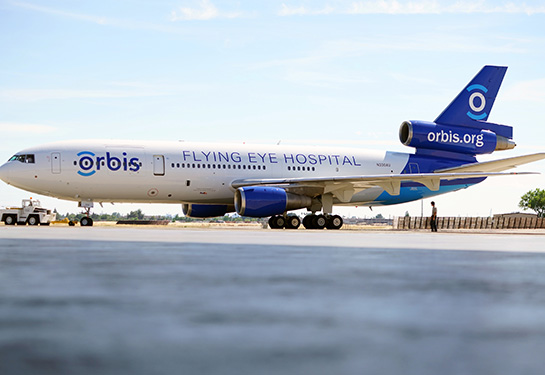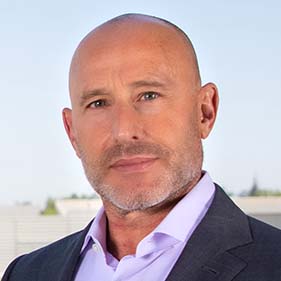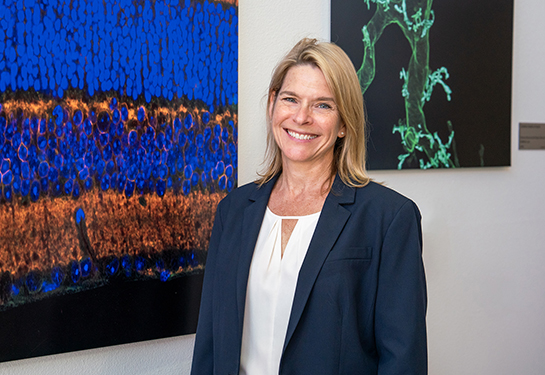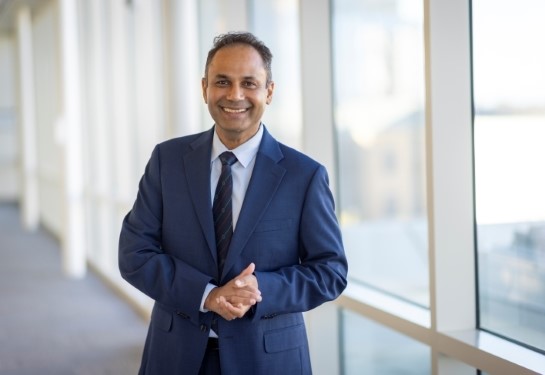Orbis and UC Davis team up to train eye care teams from Latin America
Training overlaps with World Sight Day on October 13, which focuses on the importance of eye care
In the leadup to World Sight Day, global eye care nonprofit Orbis International and UC Davis Health announce the launch today of a two-week training project on board the Flying Eye Hospital – a fully accredited ophthalmic teaching hospital on board a plane. Orbis’s clinical staff and volunteer faculty (medical experts) along with UC Davis Health physicians and staff will share their knowledge with nearly 50 ophthalmologists, ophthalmology residents, nurses, and biomedical engineers from Bolivia, Chile, and Peru, helping them build skills to fight avoidable blindness in their communities.
The ophthalmologists and ophthalmology residents participating in the training will hone their skills using leading-edge ophthalmic surgical simulation training technology on the Flying Eye Hospital, which is currently at Moffett Federal Airfield, in Mountain View, California.
The nurses and biomedical engineers will have hands-on training at the UC Davis Health Center for Simulation and Education Enhancement, a state-of-the-art facility focused on supporting interprofessional medical education and research activities, in Sacramento, California. Simulation training allows the visiting eye care teams to grow their confidence in a training environment before moving on to real-life surgical procedures.
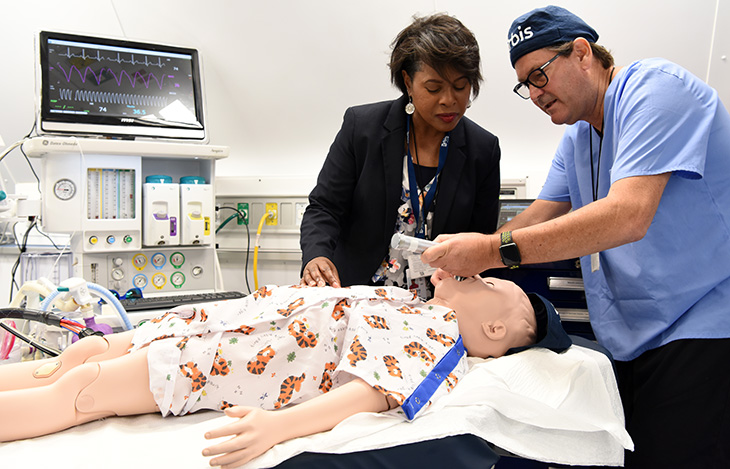
“Orbis has a long history of training eye care professionals in Latin America. After delivering virtual trainings throughout the pandemic in the region, we are thrilled to host participants once again for in-person training on board the Flying Eye Hospital,” said Derek Hodkey, president and CEO of Orbis International. “This project represents a wonderful opportunity to provide quality hands-on training through simulation as a means to fight against avoidable blindness around the world.”
“At UC Davis Health, we are committed to health equity and successful outcomes for patients – everywhere,” said David Lubarsky, CEO of UC Davis Health. “As a nationally ranked teaching hospital, an important part of what we do is share our treatment techniques and medical research with other providers. This partnership with Orbis will provide training to improve eye health and help prevent blindness in places where access to care is limited, and providers can’t easily make it to California. We’re excited about sharing our expertise in this way and taking the training to places where it will help patients around the globe.”
This partnership with Orbis will provide training to improve eye health and help prevent blindness in places where access to care is limited, and providers can’t easily make it to California."—David Lubarsky
Learning surgical skills for cataract removal will be a major focus of the training for the ophthalmologists and ophthalmology residents. Cataracts are the leading cause of blindness in Bolivia and Peru despite being treatable with an operation that can take as little as ten to fifteen minutes. Participants will also learn to treat other conditions that threaten vision, including glaucoma and macular degeneration, respectively the second- and third-most common causes of blindness in Bolivia and Peru.
A select group of these participants, who are already highly experienced ophthalmologists, will also participate in a train-the-trainer course, which will deepen their ability to train the next generation of eye care professionals. This helps ensure ongoing continuity of and local access to eye care in their home countries.
Nurses will train in simulated emergency scenarios, patient recovery, operating room procedures and sterilization practices. In addition, nurses will receive an orientation to eye banking and get hands-on experience evaluating corneal tissue at Sierra Donor Services Eye Bank. Senior nurses will also participate in a train-the-trainer course integrated into the nursing training program. Biomedical engineers and technicians will train in ophthalmic equipment maintenance and repair. Part of this training will include a workshop hosted by biomedical engineers from Alcon, a long-time supporter of Orbis.
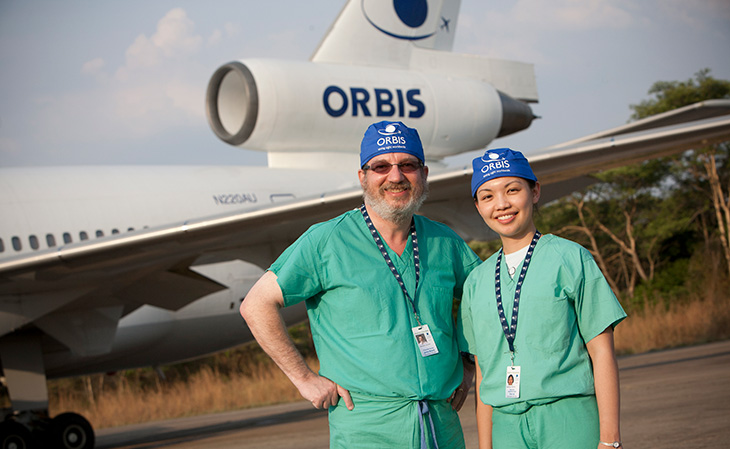
Providing sight-saving care to communities in need
This year, Orbis is celebrating 40 years since the Flying Eye Hospital took its first flight. Since 1982, three generations of the Flying Eye Hospital have taken training to eye care teams in over 95 countries around the world. In 2020, Orbis reimagined in-person Flying Eye Hospital trainings as virtual ones to ensure that eye care teams could still access critical training safely during the pandemic. Orbis reached nine countries in 2020 and 34 countries in 2021 through virtual Flying Eye Hospital projects. As the plane has returned to in-person programming, the virtual model Orbis developed is being used in conjunction with in-person training, a concept known as “blended learning,” to ensure that participants can maximize the time with their mentors, continue their education after the plane leaves and more.
Globally, 1.1 billion people live with vision loss, and 90% of cases are completely avoidable. Nine out of ten people with vision loss live in low- and middle-income countries, where quality eye care is often difficult, sometimes impossible, to access. An effective, lasting solution to this challenge is to ensure that eye care professionals in such countries can access quality ophthalmic training, building the skills they need to provide quality eye care to patients in their communities.
Over the past four decades, Orbis has conducted tens of millions of eye screenings and performed eye surgeries and laser treatments for hundreds of thousands of patients. Orbis has also trained hundreds of thousands of eye care professionals at all levels, including tens of thousands of medical doctors. The people Orbis trains go on to provide sight-saving care in their communities and, in many cases, go on to train eye care professionals themselves.
About the UC Davis Eye Center
The UC Davis Eye Center provides world-class eye care, pioneers collaborative vision research, and trains the next generation of specialists and investigators to become leaders in the Sacramento region and beyond. The Eye Center team aims to transform vision care and develop cures for blinding eye diseases, from cornea to cortex. To learn more, visit the website.
About Orbis
Orbis is a leading global non-governmental organization that has been a pioneer in the prevention and treatment of avoidable blindness for four decades. Orbis transforms lives by delivering the skills, resources and knowledge needed to deliver accessible quality eye care. Working in collaboration with local partners, including hospitals, universities, government agencies and ministries of health, Orbis provides hands-on ophthalmology training, strengthens healthcare infrastructure and advocates for the prioritization of eye health on public health agendas. Orbis operates the world's only Flying Eye Hospital, a fully accredited ophthalmic teaching hospital on board an MD-10 aircraft, and an award-winning telemedicine platform, Cybersight. For the past ten consecutive years, Orbis has achieved Charity Navigator’s coveted four-star rating for demonstrating strong financial health and commitment to accountability and transparency, placing Orbis in the top 3% of U.S. charities. For the past two years, Orbis has earned GuideStar’s platinum Seal of Transparency. In 2022, Orbis earned “accredited charity” status from the Better Business Bureau by meeting all 20 of their standards for charity accountability. To learn more, visit the website.
About Sierra Donor Services Eye Bank
Sierra Donor Services Eye Bank (SDSEB) is a nonprofit donor network coordinating eye recovery, processing, and distribution in the states of California, Nevada and Tennessee. SDSEB’s core purpose is “to save and enhance lives.” They do this by fostering an environment where selfless professionals are committed to life-changing work; their performance is measured by the impact they have on those who make transplant possible and those whose life is enhanced by these gifts. By supporting a local focus on donors, donor families, and the lives of those impacted, being a stable community member and putting patients first, SDSEB can maximize the Gift of Sight. To learn more, visit the website.


